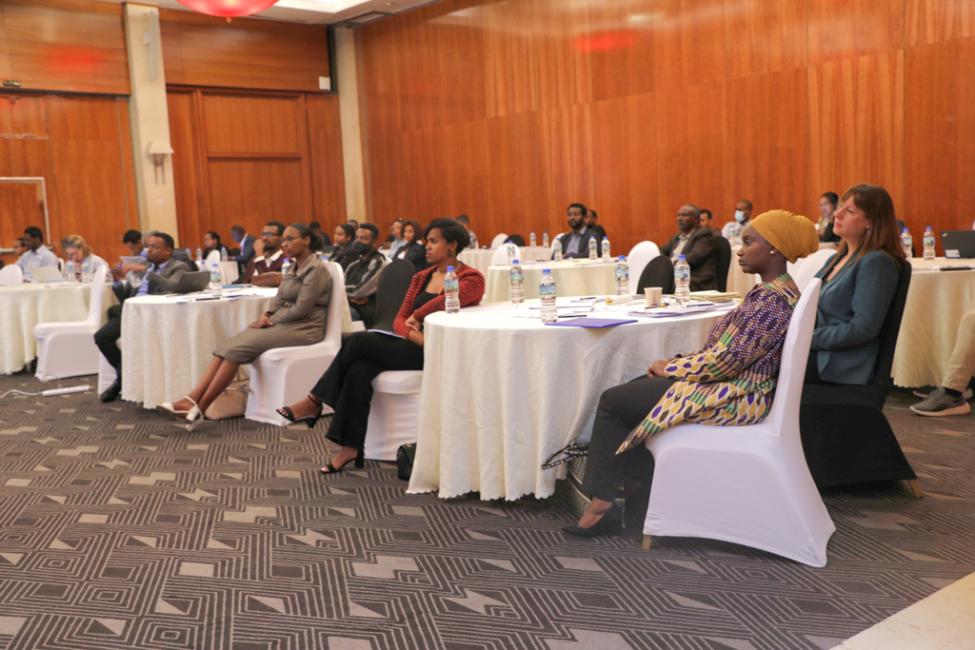-
Who We Are
WHO WE AREThe International Organization for Migration (IOM) is part of the United Nations System as the leading inter-governmental organization promoting humane and orderly migration for the benefit of all. IOM has had a presence in Ethiopia since 1995.
About
About
IOM Global
IOM Global
-
Our WORK
Our WorkAs the leading inter-governmental organization promoting since 1951 humane and orderly migration, IOM plays a key role to support the achievement of the 2030 Agenda through different areas of intervention that connect both humanitarian assistance and sustainable development. Across Ethiopia IOM has been contributing to the efforts of the Government to effectively manage migration through a wide variety of projects and programmes.
Cross-cutting (Global)
Cross-cutting (Global)
- Data and Resources
- Take Action
- 2030 Agenda
The Government of Ethiopia and IOM Strive to Implement a Comprehensive National Referral Mechanism (NRM) for Migrants in vulnerable situations and Victims of Trafficking (VOT)
Addis Ababa, Ethiopia – Governmental and non-governmental actors in Ethiopia validated the National Referral Mechanism for the protection of migrants in vulnerable situation and victims of trafficking (VoT) in a workshop organized in Addis Ababa from 10 to 11 November 2022. IOM supported the government to setup NRM and develop Standard Operating Procedures, Minimum Service Standards, Referral Flow Chart, Service Directory and Referral form to facilitate standardized service provision. The NRM in Ethiopia aims to avail consistent, predictable and accessible referral system for the protection and assistance of victims through clearly stipulating the role and responsibilities of institutions working on rescuing, returning, rehabilitating and reintegrating all migrants in vulnerable situations.
The National Partnership Coalition under the auspices of Ministry of Justice, the International Organization for Migration (IOM) and partners organized a two-day validation workshop to gather inputs on a standardized comprehensive national referral mechanism for victims of trafficking and other vulnerable migrants in Ethiopia, and the ways forward for its implementation. Federal governmental offices, civil societies, UN agencies and intergovernmental organizations actively participated and provided substantial feedback on the content and applicability of the NRM tools.
“Many migrants in Ethiopia, at different stages of the migratory experience, are exposed to violence, abuse, and various forms of deprivation of their basic rights” said Abibatou Wane, IOM Ethiopia Chief of Mission in her opening remarks. “Such experiences result in significant physical, social, and psychological harm and trauma,” she added.
She also highlighted that victims often require comprehensive and coordinated support, starting with timely identification and referral to specialized protection and assistance services, following whole-of-government and whole-of-society approaches.
IOM works globally with state and non-state actors to protect and to uphold the rights of migrants. Since its presence in Ethiopia at the beginning of 1995, IOM has been contributing to the Government of Ethiopia’s efforts to enhance migration management by responding to the needs of individuals and their communities, as well as developing systems and capacities for a strengthened structural response to the challenges related to migration management.
Ms Wane reiterated that NRMs have been a centerpiece of counter-trafficking efforts worldwide, contributing to a more coordinated approach to combating trafficking in persons and protecting the victims, and facilitating cooperation between victim protection and law enforcement agencies. “The NRM responds to the needs of various stakeholders, including governments, civil society and international organizations in line with the Global Compact for Safe, Orderly and Regular Migration (GCM) and the Sustainable Development Goals,” she said.
The FDRE Ministry of Justice state minister Mr. Alemante Agidew’s representative Mr. Abraham Ayalew, head of the National Partnership Coalition Secretariat, highlighted the growing number Ethiopian migrants in international borders and the challenge they are facing.
Mr. Abraham said the expansion of irregular migration has been a source of human right violation and abuse for Ethiopian citizens, so Ethiopia has been instrumental in the ratification process of Global Compact for Safe, Orderly and Regular (GCM) from its inception.
He also said for the effective implementation of the GCM the government of Ethiopia has prepared different policies and legal frameworks such as proclamation 1178/2020 and its subsidiary directives. National Referral Mechanism Directive number 563/2020 is one of the directives for the rescue, return, rehabilitation and reintegration of victims. He requested government and non-government organizations working on the protection and assistance areas to coordinate and work for effective operationalization of the NRM tools.
In his conclusion, he appreciated the efforts made by the IOM for supporting the preparation of the tools and assured the government commitment for the implementation.
Representatives who attended the workshop include members of the National Partnership Coalition, government ministries and departments, service providers, commissions, embassies, UN agencies, intergovernmental organizations, international and local Civil Society Organizations.
The development of Ethiopia’s NRM is a project supported by the United States Office to Monitor and Combat Trafficking in Person (JTIP) and the Royal Norwegian Ministry of Foreign Affairs.
For more information, please contact Alemayehu Seifeselassie, email: salemayehu@iom.int.

